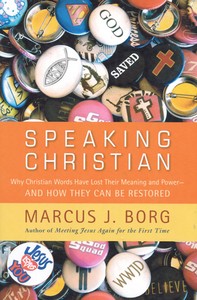
Marcus Borg is one of the best writers who open critical biblical scholarship to the lay reading public. In this volume, he describes how words have been changed over time to present a more conservative picture of Christianity than most of us feel comfortable with. Borg looks at the historical meanings of the words and how they were originally used to change the base of language toward something more modern (and liberal). Most of this comes from translation anyway, so we only get a black-and-white copy of the original color picture intended with these powerful words.
Since there are so many chapters, and they are very short, we will be taking several words/ideas at a time. Meetings are from January 8, 2012 to February 12, 2012.
- Log in to post comments


Comments
Week 6 Questions
Heaven
How do (did?) you decide what to believe about what happens after your death?
Creeds and Trinity
OK. It's a bit more than a comma, but that bit is what happened TO him, not what he did.
Take a look at the Affirmations in our current hymnal. (880 – 889) Defend your choice of a favorite.
Lord's Supper
Do you think of communion primarily as “horizontal”, people – to – people, or “vertical”, you to God? (or.... some other way)
Lord's Prayer
Attached is a copy of The Didache that you may find interesting, especially if you don't know what it is. Which of the four “not included” themes do you find most significant? Why?
Otherwise, I find this chapter a good condensation of Crossan's “The Greatest Prayer”.
Conclusion
What is Christianity primarily about: life after death or bringing God's kingdom into this life, here and now? Do you think science and technology are helping to bring about God's kingdom on earth?
Week 5 Questions
Forgiveness and Repentance
How important is God's forgiveness in your life? How about other forgiveness?
How have you been transformed by repentance? (if you have)
John 3:16
How do you feel when you come across John 3:16? Does Borg's analysis help?
Born Again
Are you able to hear “born again” in the framework Borg uses?
The Only Way
How does this title's meaning change if we change from orthodoxy to orthopraxy?
The Assension
What does Assension mean or signify to you?
Pentecost
Does Pentecost “undo” what happened at the Tower of Babel? If so, why is there so much misunderstanding in the world?
Rapture and Second Coming
Who (else) has read any of the “Left Behind” novels? Comments?
Is the “second coming” happening continuously?
Remember: Potluck Next Week
We finish our study sessions with a potluck at the Lutz home. Therefore
we will start with Dinner at 6:00 PM on Sunday, February 12. It's a
true potluck, bring whatever you wish to share.
Week 4 Questions
Easter
1 What do you think happened after Jesus died?
2 What if Easter took 40 years instead of 3 days?
Believing and Faith
3 What do you think happened to our world-view such that beloving became believing? (and the same with faith)
Mercy
4 Do we bring God down to our own level when we substitute compassion for mercy?
5 Does Borg sidestep the issue of mercy when he titles the chapter Mercy and then discusses compassion instead?
Righteousness
6 What is the modern equivalent of crucifixion?
7 How did your understanding of righteousness change on reading this chapter?
Sin
8 Do you agree that “sin [is] the primary metaphor for describing the human predicament.”? If not, what problem / situation do you feel religion should address?
Week 3 Questions
Chapters 5 - 8
1. Can you think of another analogy for God besides “God as A being” (transcendent) and “God as a sacred presence” (panentheism)?
2. If no concept of God is adequate, what do we gain by using the word God?
3. How do you imagine God's character, if you do?
4. What's your passion in life, and does it relate to God's?
5. If you believe that “Jesus Lives!”, what does the word “live” mean?
6. Do you like any of the titles for Jesus best? Why?
7. How much or how often has the meaning of Jesus' death changed for you?
8. Don't forget the....
Week 2 Questions
Salvation - Bible
1. What do you recall of your first understanding of salvation?
2. In Exodus, salvation is from economic, political and religious bondage. What does salvation free you from (or perhaps, to) today?
3. What kind of social structure existed among Jews between Exodus and the return of the Kings?
4. “[W]hat's our product?” Specifically.
5. How much (or what kind of) authority does the Bible have for you?
6. Borg suggests that canonization occurred in steps between 400 BCE and 700 CE. Why have we stopped?
7. Considering you view of the Bible, what does the “Word of God” imply about your understanding of God?
8. Don't forget the questions at the back of the book.
Week 1 Questions
Intro, Chapters 1 and 2
1. Which of the words and phrases are you most concerned about? Why?
2. Why don't “theology, doctrine, and dogma” get their own chapters?
3. Vote: How many of you started in a Heaven-and-Hell Framework?
4. Borg uses “elephant” as a word for which frameworks really matter. What word would you use as another example?
5. Which of the four elements of the heaven-and-hell framework do you find the most problematic? Why?
6. When was the last time you heard a communal confession at Napa FUMC?
7. How much trouble, if any, do you have with the Religion vs. Science question? How have you resolved any issues therein?
8. Be sure to consider the appropriate “Discussion Questions” at the back of the book.